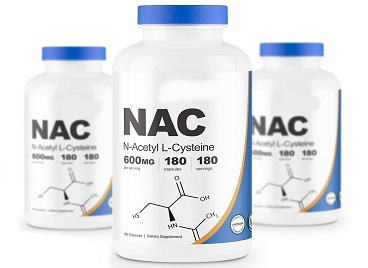BREAKING NEWS! N-Acetyl Cysteine Can Cause Conformational Perturbation Of SARS-CoV-2 Spike Protein, Indirectly Inhibiting The Virus!
COVID-19 News - N-Acetyl Cysteine - Conformational Perturbation - SARS-CoV-2 Spike Protein Jul 23, 2023 1 year, 8 months, 3 weeks, 2 days, 8 hours, 57 minutes ago
N-acetyl cysteine can inhibit SARS-CoV-2 and ACE-2 Binding by increasing the probability of structural deformation of the viral spike protein
COVID-19 News: The ongoing SARS-CoV-2 pandemic has wreaked havoc across the globe, leaving behind devastating consequences for public health and economies alike. As researchers and medical professionals tirelessly search for effective therapeutic interventions, a groundbreaking discovery has emerged, revealing the remarkable potential of N-acetyl cysteine (NAC) in combating the deadly virus.

Previous
COVID-19 News reports had already showed that NAC could help with COVID-19 but this new study shows that NAC can actually cause structural deformations to the SARS-CoV-2 spike proteins to prevent it binding to receptors of the human host.
https://www.thailandmedical.news/news/breaking-covid-19-drugs-study-shows-that-n-acetylcysteine-or-nac-is-an-effective-antiviral-and-immunomodulatory-drug-against-all-sars-cov-2-variants
https://www.thailandmedical.news/news/breaking-sars-cov-2-dysregulates-one-carbon-metabolism-in-human-host-with-implications-for-various-long-term-diseases-n-acetyl-cysteine-helps
https://www.thailandmedical.news/news/breaking-covid-19-research-russian-study-indicates-that-glutathione-deficiency-affects-covid-19-susceptibility,-nac-supplements-helps
https://www.thailandmedical.news/news/breaking-study-shows-that-sars-cov-2-infections-lead-to-increased-levels-of-oxidative-stress,-oxidant-damage-and-glutathione-deficiency
SARS-CoV-2's Viral Fusion Mechanism
At the heart of SARS-CoV-2's infectious prowess lies the spike protein - a trimeric glycoprotein adorning the virus's surface. This spike protein is the key to unlocking human cells by binding with the angiotensin-converting enzyme-2 (ACE2) receptor on the cell surface. Once this interaction occurs, the virus can fuse with the host cell and initiate infection. Understanding this viral fusion mechanism has been crucial in identifying potential targets for therapeutic intervention.
NAC's Potential as a Game-Changer
Recent in silico studies have uncovered a potential game-changer in the form of N-acetyl cysteine (NAC), a comp
ound widely used in clinical medicine as an antioxidant and mucolytic agent. The groundbreaking hypothesis posits that NAC could indirectly inhibit SARS-CoV-2 by targeting the viral spike protein and disrupting its interaction with the ACE2 receptor on human cells.
Perturbing the Spike Protein Conformation
The research proposes a fascinating mechanism of action for NAC. By reducing a solvent-accessible disulfide bond (Cys391-Cys525) within the spike protein, NAC induces a conformational perturbation that disintegrates the protein's structural architecture. This structural alteration leads to a weakening in the binding affinity between the spike protein and the ACE2 receptor. The result is a potential reduction in the virus's ability to enter human cells and initiate infection.
Validation Through Proteomics and In Silico Analysis
Proteomics data supported the hypothesis, indicating that NAC forms covalent conjugates with solvent-accessible cysteine residues within the spike protein. In silico analysis further confirmed the disruption of key interacting residues in the spike protein's receptor-binding domain, leading to a significant reduction in binding affinity with the ACE2 receptor.
The Clinical Implications
The discovery of NAC's potential to interfere with the viral fusion process is groundbreaking. If further validated through clinical trials, NAC could emerge as a promising candidate for pharmacopreventive and therapeutic interventions against COVID-19. Additionally, the findings have implications for exploring analogues of NAC that could enhance its inhibitory effect on the virus.
COVID-19: A Multi-Faceted Disease
The severity of COVID-19 is multifactorial, with various factors contributing to its pathogenesis and complications. The virus's affinity for the ACE2 receptor, combined with an overactive immune response and cytokine storm, contributes to the disease's complexity. Interestingly, NAC's properties as an antioxidant, anti-inflammatory agent, and its potential to improve cellular redox status and inhibit gene expression of pro-inflammatory cytokines, make it an intriguing candidate to address multiple aspects of COVID-19 pathology.
Promising Results in Antiviral Assays
In the laboratory setting, antiviral assays using VeroE6 cells showed that NAC caused a remarkable 54.3% inhibition of SARS-CoV-2 replication at 48 hours post-infection.
Although the inhibition percentage may not be as high as some other antiviral agents, the potential for NAC as part of a combination therapy or as a preventative measure warrants further exploration.
A Path Forward
The implications of NAC's ability to disrupt the spike protein's conformation and inhibit viral fusion are profound. As further research unfolds, the pharmaceutical community must conduct further studies to validate NAC's mechanism of action and assess its safety and efficacy in clinical settings. If proven effective, NAC could significantly bolster the arsenal of therapeutic options against COVID-19, offering hope for a world desperately seeking an end to this devastating pandemic.
In conclusion, the discovery of N-acetyl cysteine's potential to indirectly inhibit SARS-CoV-2 by disrupting the viral spike protein's interaction with the ACE2 receptor marks a pivotal moment in the ongoing battle against COVID-19. The journey from in silico studies to potential clinical application is a promising path.
The study findings were published in the peer reviewed journal: Journal of Biomolecular Structure and Dynamics.
https://www.tandfonline.com/doi/full/10.1080/07391102.2023.2234031
MEDICAL DISCLAIMER: Please note that this article is based simply as research findings and not as medical advice. NAC has not been approved by any regulatory agency around the world to treat COVID-19. Please do not attempt to take NAC without consulting a licensed medical doctor first. Also note..do not overdose and do not take NAC for long periods of time! Certain research studies have claimed that long term usage of NAC has been associated with causing cancer while some studies claim in helps in cancer. Consult a licensed medical doctor and see what they advise.
For the latest
COVID-19 News, keep on logging to Thailand Medical News
